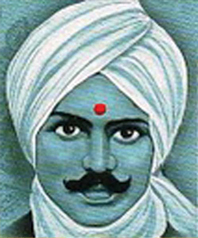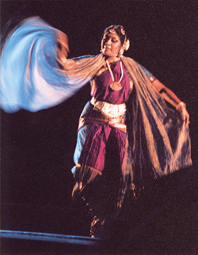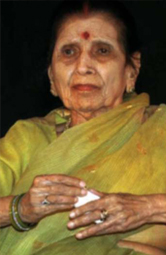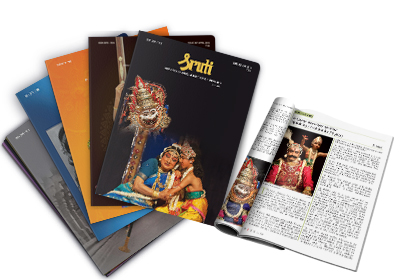COVER STORY - Subramania Bharati the composer by S. SANKARANARAYANAN

Subramania Bharati was a celebrated National Poet of India. He was also a good singer, composer, and enlightened critic. He was born on 11 December 1882 at Ettayapuram and died in September 1921 in Chennai.
Of the scholars who have done excellent research on Subramania Bharati’s life and works, Prof. K.R. Rajagopalan (retd.) of Madras Christian College, prepared a statistical analysis of the ‘musical poems’ of Bharati in 1983. The monograph is in Tamil and is titled Bharatiyin Isaippulamai. It is in a mimeographed form and, to the best of my knowledge, it has not been published. (In the past, Prof. Rajagopalan had made similar studies on the kriti-s of Tyagaraja and Muthuswami Dikshitar as well.)
Seeni Viswanathan is another person who has spent a lifetime on the literary works of Bharati and brought out about 30 books on them, all in Tamil. One of them is ‘Bharatiyum Sangeetamum’, which appeared in 1999. Unfortunately no copy is available.
Besides these two, the late T.S. Parthasarathy, scholar and musicologist, authored an article Bharati and the Fine Arts in the Journal of the Music Academy sometime in the 1980s.
NEWS & NOTES - A spectrum of emotions by VIDYA SARANYAN

Bharatham Kathai Kathaiyaam, the festival organised by Natyarangam (dance wing of the Narada Gana Sabha Trust) in mid-August featuring accomplished dancers was remarkable. It presented contemporary themes that spoke of not just love, devotion and sorrow but a wider spectrum of issues. In an intriguing approach, this festival drew dancers away from the familiar terrain of conventional themes and lyrics and impelled them to compose for selected short stories – where a further twist was the exclusion of lyrics from the set music.
To the Chennai rasika looking for fresh horizons in the classical art scene a novel Bharatanatyam presentation is always welcome, and when it is the brainchild of the scholarly Natyarangam committee, the expectation rises a notch higher.
The committee comprising S. Kannan, ‘Charukesi’ Viswanathan, K.S. Subramaniam, S. Janaki, Kalpakam and Maj. Gen. A. Balasubramaniam, and Sujatha Vijayaraghavan, and headed by R. Krishnaswami (Secretary, Narada Gana Sabha) meticulously shortlisted twelve short stories in Tamil. The works were by renowned authors like Pudumai Pithan, Thi. Janakiraman, La.Sa. Ramamirtham, Ashokamitran, Sundara Ramaswamy, Sujatha, Ambai, R. Chudamani, Indira Parthasarathy, Jayakanthan, Sivasankari and Poomani.
REMEMBERING - Veteran patron of arts in the Capital by S. JANAKI

As the health of Sumitra Charat Ram, the grand old impresario, hovered between life and death, people around her were convinced she would bounce back to health, as longevity and courage were in her very genes. But it was not to be. On 8 August 2011, just three years short of a century, she breathed her last. Referred to as “Mummy” by the art fraternity, she patronised and nurtured artists and the performing arts in the capital for over six decades. Shri Ram Bharatiya Kala Kendra, and the Shankar Lal Sangeet Sammelan would no longer be the same. The Sammelan which began as a small concert with an informal gathering of musicians at Sumitra Charat Ram’s house at Delhi’s Curzon Road has now become a forum for talented youth as well as renowned traditional musicians. But for her, the duet between two sitar maestros Ravi Shankar and Vilayat Khan in the 1950s would never have happened. Old timers still remember the concert that also saw Baba Allaudin Khan playing with son Ali Akbar Khan.
Sumitra married Lala Charat Ram, three years her junior, in 1940. This was something unheard of at that time, but Sumitra liked to make her own rules.
SEMINAR - “A Catch 22 situation”
This is the third and final part of a panel discussion on the Role of Media in Arts conducted by the Bombay chapter of ITC-SRA on 16 January 2010, at the National Centre for the Performing Arts, Mumbai, excerpted and edited by V. Ramnarayan. This section includes the comments made by members of the audience (names in blue).
Convener
Arvind Parikh, sitarist, President, Indian Musicological Society; Chairman, ITC-SRA (West)
Moderator
Shanta Gokhale, arts and literary critic, playwright, author
Panelists
Dileep Padgaonkar, Consulting Editor, The Times of India
N. Murali, Senior Managing Director, The Hindu
Naresh Fernandes, Editor-in-Chief, Time Out
V. Ramnarayan, Editor-in-Chief, Sruti
Ayaz Memon, formerly Senior Editor, DNA
Shanta (to the audience): We have thirty minutes for all of you. Please make good use of them. We welcome questions, but won’t mind comments either, but make them sharp and brief.
Dr. Sumita Ojha: I am very thankful to all of you for such a great discussion. There are good reviews in Hindi and other language papers. I am a cinema journalist. In the Hindi edition of (the popular film magazine) Stardust, we most of the time translated interviews done in English. This is also the case in other art forms. We have some great journalists in Hindi but unfortunately they are only expected do transcription and translation from English newspapers. Why can’t we have the reverse? I can give you the names of some good journalists who are writing in Hindi.


